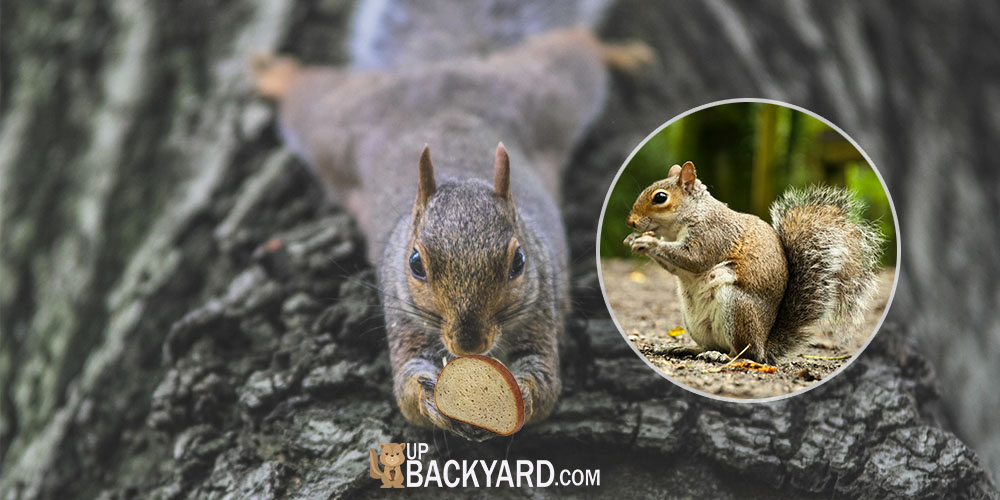Squirrels are everywhere. Whether you are encountering them in your backyard, a local park, or on a forested pathway, it is impossible not to cross their paths. Not only are they incredibly common, they are also very cute.
As humans, we tend to want to interact with wildlife and offer them food, water, and even shelter in times of need.
But what do squirrels eat? Can squirrels eat bread?
Squirrels are not picky eaters and you will find them scouring garbage cans, leftover picnics, bird feeders, and gardens looking for snacks.
While squirrels can eat bread and other human food scraps, it is important to try not to feed them as they can get sick from eating too much human food.
Squirrels are wild animals that have not yet adapted to eating diets high in sugars, carbs, or processed foods and eating too much bread or other human food scraps can be hard on their digestive systems and overall health.
Can I Feed Wild Squirrels?
Like any wild animal, it is best NOT to feed wild squirrels. Squirrels can become sick or overweight easily if they are fed an abundance of human food.
When I mention human food scraps, I am referring to cooked or processed food that is not found in nature or in a squirrel’s natural habitat.
Squirrels do not have a body that is equipped like humans. These animals lack the ability to properly digest these foreign types of food and convert them into energy.
Instead, the high levels of sugar and carbs in many foods like bread, shocks the squirrel’s system. This can create sugar highs and even damage the kidneys.
Fruit, vegetables, nuts, and seeds that are found naturally and easily in a squirrel’s natural habitat are not necessarily bad for a squirrel’s health. However, feeding squirrels or other wildlife can create dependence.
When animals become dependent on humans for food, shelter, or water, it can upset the balance in the wild.
It also can make wild animals less afraid of human interaction which then can lead to more instances of humans being bitten, scratched, or even attacked by the animals.
If a squirrel becomes dependent on humans for food, they will forget how to forage and store food for themselves.
In animals that hibernate or build nests for the winter, it is crucial that they are able to stock up on and store enough food to last them through the cold season.
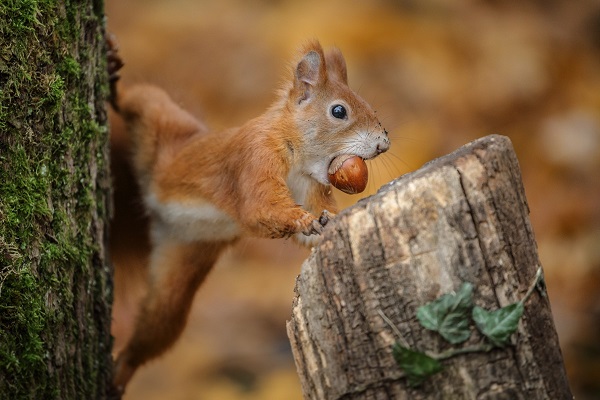
Human food scraps like bread, chips, fruits, packaged foods, and dairy products will not keep for an entire season the way that nuts or seeds would.
If a squirrel collects and stores human food scraps instead of their usual food sources, they may find themselves without enough food as it begins to go bad, mold, or disintegrate with the cold weather.
Did You Know?
Squirrels tend to be very drawn to bird feeders filled with seeds or other bird food. You can help prevent squirrels from accessing the feeder by choosing hanging bird feeders instead of feeders that sit on a pole in the ground.
If you do choose a feeder that sits on a pole, you can install a squirrel guard that will prevent squirrels from being able to make it all the way to the seed in the feeder.
What Should I Feed a Squirrel?
While the best thing to feed a squirrel is nothing, allowing squirrels to eat nuts, seeds, raw fruit, or vegetables will not necessarily harm the health of the animal.
If you must feed wild squirrels, it is best to choose foods that would be naturally found in their habitats that their bodies are used to consuming.
Peanuts are another great source of food for squirrels. Peanuts provide a good amount of protein and help keep the animal feeling fuller for a longer amount of time.
Setting out large amounts of peanuts near the end of fall will allow squirrels to begin to store this nutritionally dense food for the long cold winter season.
Fresh fruit is a delicious and nutritious treat that any squirrel would love to eat. Even setting out rinds of watermelon, skin from mangoes or peels of bananas will provide squirrels with a healthy snack in the summer heat.
Fresh melons and cucumbers provide added hydration as these foods are bursting with water.
Carrots are surprisingly sweet, especially for squirrels. These vegetables tend to be ready for harvest in early spring and then throughout the spring into the summer with a late harvest in the fall.
Fresh carrots are a great source of nutrition for squirrels in the summer months. Be careful not to feed the wild animals too many carrots as these can be high in sugar.
Squirrels love corn. Both cooked and uncooked corn on the cob provides a wonderful snack for squirrels.
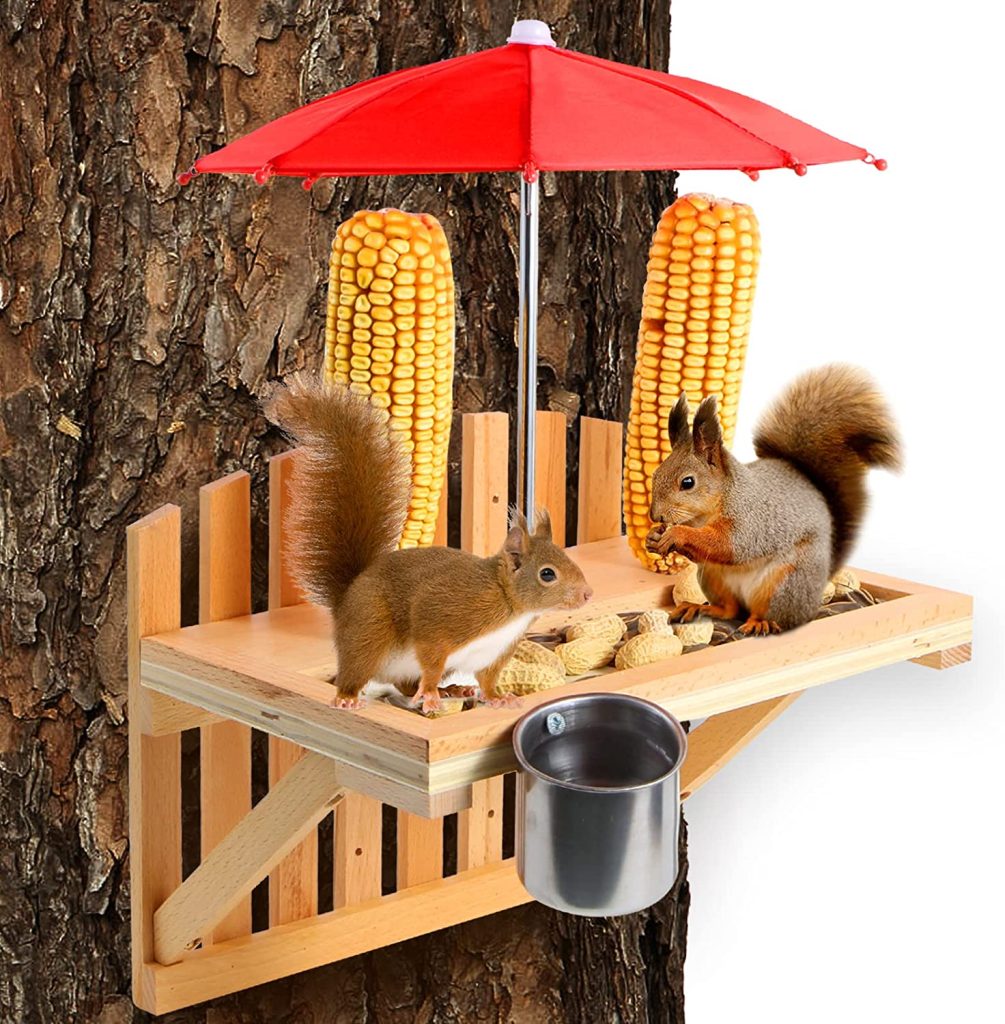
You can even find squirrel feeders that allow you to place a corn cob on them so you can watch these adorable little creatures eat!
What Can’t You Feed a Squirrel?
When it comes to food to avoid giving to wild squirrels, anything that is manmade is top of the list.
Processed foods like bags of chips, candy, canned soups, processed bread, pizza crust, and other junk food should all be avoided at all costs.
Many squirrels will not pick up these types of foods if there are other options available. However, sometimes there are no other options for these animals and they will resort to eating whatever they can scavenge and find.
When I looked at Exotic Nutrition’s website, I learned that fruit seeds and pits as well as Avocado skins and pits are all poisonous to squirrels and should be avoided at all costs to prevent serious injury or even death.
They also listed cashews, dried corn, sunflower seeds, pine nuts and salty foods as things we should avoid giving to squirrels. Human junk food also made the list.
It may feel like common sense that wild animals should only be given food they naturally eat, but it truly can be life or death for these animals.
Should I Feed a Baby Squirrel?
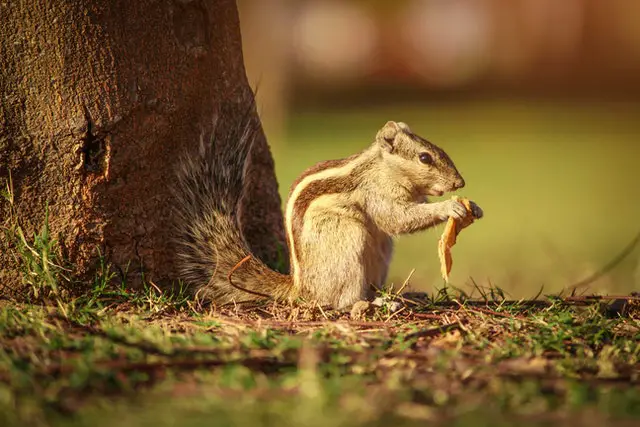
While adult squirrels tend to fend for themselves, what happens if you find a small baby squirrel alone?
The baby may be small and helpless and finding its nest may be next to impossible as they tend to be built very high in trees.
What can you do? Should you feed a baby squirrel?
It is best NOT to feed a baby squirrel. Even though they are small and may need attention, it is best to leave caring for orphaned or injured baby squirrels to professional wildlife rehabilitators. It is very challenging to keep wildlife babies alive, even for professionals.
Baby squirrels require a very rigorous feeding schedule with special milk. Unlike puppies or kittens, baby squirrels are not easily cared for by humans.
Before you call your local wildlife rehab center, it is best to be sure that the baby does indeed need external help.
Many times, a baby squirrel falls from its nest and the mom will locate the baby and bring it back to the nest on her own.
If you notice the baby is injured, bloody, has been in a pet’s mouth, is cold, wet, crying nonstop, or covered in flies, the baby is most likely orphaned or injured and should be taken to the closest wildlife rehabilitation center.
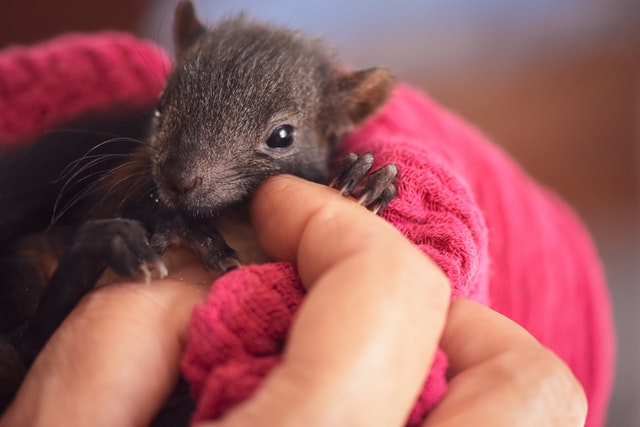
Baby squirrels can make it on their own after they have reached 10-12 weeks of age. At this point, they are still very small and look like babies.
Even though they look like they will not survive on their own, it is best not to intervene. A squirrel at this age would have a slightly bushy tail and be able to climb a tree.
If you find a squirrel alone that looks this age, place out some nuts, seeds, or water to help them, but do not attempt to cage or home the squirrel.
If the baby does not fit into any of those categories, it may have fallen and the mom will come to rescue it soon.
Be sure to keep any dogs or cats from the area to protect the baby. Keep an eye on the baby from a distance so the mother won’t be frightened to come down and take her baby back to the nest.
If you notice that the mom has not returned for the uninjured baby squirrel and the sun is beginning to set, you can collect the baby and place it in a safe space for the night.
Place uncooked rice in a sock and place it in the microwave for a few minutes to warm it. Place the warm sock near the baby to help keep it warm.
First thing in the morning, return the baby to where it was found and wait a few hours to see if the mom returns. If she does not return for her baby within a few hours, call your local rehab center.
Final Thoughts
Squirrels are adorable creatures that live alongside us. We see them everywhere and almost every day. Even though we are well acquainted with these animals, we sometimes want to get a closer look or offer these animals food.
It is never a good idea to feed wild animals, even squirrels. This is because the food we eat or offer to squirrels may not be the most nutritiously appropriate foods for them.
This can create problems in their digestive systems. It can also lead to obesity and other health concerns.
Feeding wildlife can also create a dependence on human interaction to sustain themselves.
When animals rely on humans for food, they can disrupt their normal forage seasons. They may also begin foraging for foods that are not sustainable.
If we must give squirrels food it is best to avoid feeding them processed foods, fruit seeds or pits, avocado skins or pits, cashews, junk food, or sunflower seeds.
Instead, offering peanuts, fresh corn, cucumbers, watermelons, or carrots will provide the animals with nutritious options.
It is important to never feed a baby squirrel, no matter how cute it is. If you find a baby squirrel, check to see if it needs human intervention. Many times the mother will come and take the baby back to the nest.
If the baby is wounded or abandoned, call your local wildlife rehabilitation center for further instructions.
If the baby is older, between 10-12 weeks and has a slightly bushy tail, the squirrel is old enough to be on its own and will be fine. You can leave out some healthy food options and water for the animal to help it along if you feel it is appropriate.
Squirrels are very fun to watch as they dart around from tree to tree and hop through the grass. Adding a squirrel feeder can increase the amount of time you can spend watching these graceful animals in their natural habitats.
Learning how to interact with and care for wild animals like squirrels deepens are understanding and empathy for the world around us.
